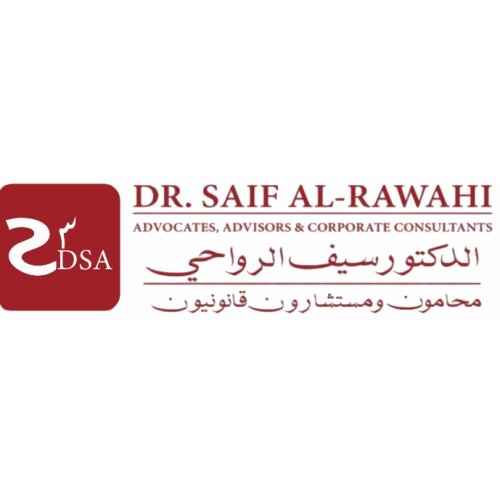Best Acquisition / Leveraged Finance Lawyers in Oman
Share your needs with us, get contacted by law firms.
Free. Takes 2 min.
Or refine your search by selecting a city:
List of the best lawyers in Oman
About Acquisition / Leveraged Finance Law in Oman
Acquisition and leveraged finance refers to the use of debt to fund the purchase of companies, assets, or businesses. In Oman, this area of law is gaining prominence as private enterprises, international investors, and local companies participate in mergers, acquisitions, management buyouts, and other strategic investments. Leveraged finance typically involves loan agreements, security interests, and collateral arrangements that require careful legal scrutiny. The legal framework governing acquisition finance transactions in Oman is shaped by local laws and regulations, as well as international best practices to ensure the legitimacy, enforceability, and security of such agreements.
Why You May Need a Lawyer
Legal assistance is vital in acquisition and leveraged finance transactions because these deals tend to be complex, high-value, and potentially risky. Here are some common situations where you may require expert legal help:
- You are planning to acquire a business or significant assets in Oman using borrowed funds.
- You are an investor or a financial institution seeking to finance a merger or acquisition.
- Your company is selling a subsidiary or business division to another party with leveraged financing involved.
- You need advice on negotiation, drafting, or reviewing loan agreements, security documents, or intercreditor agreements.
- You wish to ensure compliance with Omani regulations on foreign investment, ownership, and collateral requirements.
- You are facing cross-border legal questions involving Omani law and international jurisdictions.
- You require due diligence on the legal title, corporate structure, or financial standing of a target company.
- There are disputes or regulatory challenges related to an acquisition finance arrangement.
Local Laws Overview
Oman's legal landscape on acquisition and leveraged finance is shaped by a range of statutes and regulatory frameworks. Key legal areas to consider include:
- Commercial Companies Law: This governs the forms of legal entities, requirements for mergers and acquisitions, and directors' duties.
- Central Bank Regulations: Omani banks and financial institutions are regulated by the Central Bank of Oman, which sets out prudential requirements on lending, security, and financial exposure.
- Securities Law: The Capital Market Authority oversees securities offerings and mergers of listed companies, requiring disclosures and approvals for significant transactions.
- Foreign Investment Law: This establishes the rules for foreign ownership and participation, which may affect acquisition deals involving international investors.
- Law of Mortgages and Security: The registration, perfection, and enforcement of security interests is governed by Omani law, which affects how lenders secure their financing through collateral.
- Insolvency Law: The Bankruptcy Law impacts the rights of lenders and investors in the event of a borrower’s default or insolvency.
Regulatory approvals, local content requirements, Shariah compliance (if applicable), and anti-money laundering laws may also play significant roles in specific deals.
Frequently Asked Questions
What is acquisition finance?
Acquisition finance refers to the funding provided to enable the purchase of a business, company, or significant asset. Commonly, this includes loans, bonds, or other credit facilities secured by the assets or shares of the target entity.
What does leveraged finance mean?
Leveraged finance is the use of borrowed funds to make acquisitions or investments, often with the acquired assets used as collateral for the loan. These deals typically involve higher risk and require careful legal structuring.
What entities are typically involved in acquisition finance transactions in Oman?
Key entities include borrowers (acquirers), lenders (usually banks or financial institutions), target companies, legal advisors, financial advisors, regulators, and sometimes investment vehicles or special purpose entities.
Are foreign investors allowed to engage in leveraged finance in Oman?
Foreign investors can participate in leveraged finance transactions, subject to Oman's foreign investment laws. Some sectors may have restrictions on foreign ownership, and transactions may require regulatory approval.
What collateral is usually required for acquisition or leveraged finance in Oman?
Collateral may include shares of the target company, real estate, equipment, inventory, receivables, or other assets. Omani law sets rules for registering and perfecting security interests.
How is due diligence conducted for these transactions?
Due diligence involves a thorough legal, financial, and commercial review of the target entity’s records, assets, contracts, compliance history, debt obligations, and intellectual property to uncover any potential risks for acquirers and lenders.
Are there any restrictions on the types of loans lenders can provide?
Bank lending in Oman is regulated, so financial institutions must comply with requirements set by the Central Bank of Oman. These may relate to interest rates, credit exposure limits, and prudential lending practices.
What approvals are required for an acquisition financed by borrowed funds?
Approvals depend on the structure of the transaction, the nature of the target, and the funding sources. Regulatory clearances may be needed from the Capital Market Authority, the Central Bank of Oman, and sector-specific bodies.
What happens in case of borrower default or insolvency?
In the event of default, lenders can enforce their security interests in accordance with Omani law. If insolvency proceedings commence, the rights of secured and unsecured creditors are determined by Omani bankruptcy and insolvency laws.
Does Shariah law affect leveraged finance in Oman?
Shariah law is relevant when Islamic finance structures are used, for example in Murabaha or Ijara financings. Conventional loans are generally governed by civil law, but parties may choose Shariah-compliant options if desired.
Additional Resources
If you are seeking more information about acquisition or leveraged finance in Oman, the following resources may be helpful:
- The Ministry of Commerce, Industry and Investment Promotion: For company registration and investment requirements
- Central Bank of Oman: For banking regulations and lending guidelines
- Capital Market Authority of Oman: For rules on securities, mergers, and public company transactions
- Oman Chamber of Commerce and Industry: For business support and information
- Local and international law firms with finance and M&A expertise
- Relevant publications, legal journals, and guides on Omani corporate and finance law
Next Steps
If you require legal advice or representation in an acquisition or leveraged finance matter in Oman:
- Identify and engage a law firm or lawyer experienced in corporate finance and M&A transactions in Oman.
- Prepare and organize your documents, including business records, financial data, loan agreements, and any correspondence with other parties.
- Request an initial consultation to discuss your goals, the structure of your deal, and the legal services required.
- Work closely with your lawyer during due diligence, drafting, negotiation, and closing of the transaction.
- Seek ongoing legal support for any post-closing matters, regulatory compliance, or dispute resolution that may arise.
Taking prompt and professional legal advice is essential to protect your interests and to ensure your leveraged finance transaction complies with all applicable Omani laws and regulations.
Lawzana helps you find the best lawyers and law firms in Oman through a curated and pre-screened list of qualified legal professionals. Our platform offers rankings and detailed profiles of attorneys and law firms, allowing you to compare based on practice areas, including Acquisition / Leveraged Finance, experience, and client feedback.
Each profile includes a description of the firm's areas of practice, client reviews, team members and partners, year of establishment, spoken languages, office locations, contact information, social media presence, and any published articles or resources. Most firms on our platform speak English and are experienced in both local and international legal matters.
Get a quote from top-rated law firms in Oman — quickly, securely, and without unnecessary hassle.
Disclaimer:
The information provided on this page is for general informational purposes only and does not constitute legal advice. While we strive to ensure the accuracy and relevance of the content, legal information may change over time, and interpretations of the law can vary. You should always consult with a qualified legal professional for advice specific to your situation.
We disclaim all liability for actions taken or not taken based on the content of this page. If you believe any information is incorrect or outdated, please contact us, and we will review and update it where appropriate.
Browse acquisition / leveraged finance law firms by city in Oman
Refine your search by selecting a city.

















